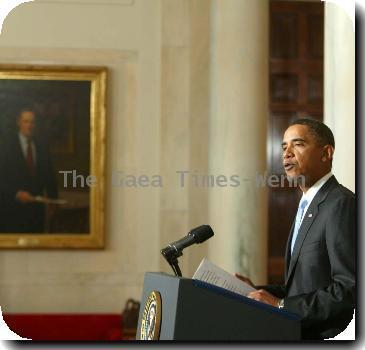Obama, Democrats tout ’significant progress’ on health care as they press for a deal
By Ricardo Alonso-zaldivar, APThursday, January 14, 2010
Obama to woo House Dems on health care deal
WASHINGTON — Striving to close the deal on health care, President Barack Obama planned a trip to Capitol Hill on Thursday to urge rank-and-file House Democrats to yield on key issues still standing in the way. Democratic bargainers were considering raising more money from drug makers and other provider groups to help pay for care.
Obama’s late afternoon visit comes amid intense White House negotiations with Democratic leaders aimed at settling core differences between the House and Senate that must be resolved before the sweeping overhaul legislation can pass.
Public support for the health care remake continues to drop, perhaps in part because of the messy debate in Congress, and lawmakers are feeling the press of other issues, from unemployment to ballooning budget deficits.
Late Wednesday, Obama and senior Democrats emerged from marathon health care talks with a declaration that they had made tough gains — but no deal just yet. The same group of leaders was to meet again at the White House on Thursday, pressing for the framework of an agreement within days.
House Democrats are uneasy over concessions they are being asked to make to preserve the 60 votes needed to pass the bill in the Senate. That includes dropping the government-run insurance option liberals have fought for and accepting some form of a tax on high-cost health insurance plans adamantly opposed by many House Democrats and by labor unions.
House Democratic leaders are pushing for more generous subsidies to help make health insurance affordable to a greater number of middle-class households, as well as other concessions.
To help pay for that, Democrats want health care providers to bear more of the cost, said lobbyists speaking on condition of anonymity because conversations within the industry were confidential. One said Democratic proposals include adding $10 billion to the $80 billion over 10 years that the drug industry had agreed to contribute, and raising the $20 billion in Senate-approved fees imposed on medical device makers by $10 billion.
Susan Feeney, spokeswoman for the American Health Care Association, said Wednesday that White House and Senate officials recently have asked the nursing home industry to agree to additional concessions.
The bill would extend coverage to more than 30 million Americans now uninsured, bar insurance companies from denying coverage to people with medical problems and attempt to slow the ruinous rate of increase in health care costs.
Early Thursday morning, Speaker Nancy Pelosi and committee chairmen gave other Democratic leaders an update on the talks with the White House and Senate. They are making “great strides working out things that previously were bigger hurdles,” Rep. John Larson, D-Conn., said on his way out of the meeting.
“They’ve got a lot of work left to do, but the thing is they’re making great progress,” Larson said.
Rep. Rob Andrews, D-N.J., predicted Obama would find a supportive audience.
“I think there is a very mature understanding here that no one ever gets everything they want,” Andrews said. “I think a lot of Democrats in the House who have misgivings about particulars will support the whole.”
Wednesday’s unusually long meeting at the White House — it began at midmorning and ended after sunset — underscored the urgency they and Obama feel about completing legislation on which they have staked so much.
The White House said the leaders covered all aspects of the legislation but released no details about where progress had been achieved or when the laborious process would end.
“We’re getting close,” House Majority Leader Steny Hoyer, D-Md., said late Wednesday.
Hoyer and others said Wednesday’s talks ranged over numerous areas of disagreement. A key point was Obama’s demand for a tax on high-cost insurance plans, a proposal designed to slow the rise in health care costs. Several union leaders were also at the White House during the day, although it was not clear whether they met with lawmakers.
The House and Senate passed the bills with just one Republican vote, and the GOP was not invited to the White House talks. Republicans say they still have a chance to derail the bill.
The proposed tax on insurance plans aside, the two sides worked for middle ground on the overall cost of the legislation and the size and extent of subsidies that would go to Americans who need help in paying for insurance.
Unclear was the fate of the proposed tax on high-cost insurance plans, and the details of a Senate-approved payroll tax increase on the wealthy.
Union officials familiar with the negotiations said the White House would like a deal on the high-cost insurance plan tax by Friday. Options being considered to lessen the impact on union members included raising the threshold at which the tax would be levied — it’s $23,000 for family plans in the Senate-passed bill — and exempting collective bargaining agreements negotiated before 2013 from the tax.
Associated Press writers Erica Werner, David Espo, Alan Fram, Sam Hananel, Ben Feller and Mark S. Smith contributed to this report.
Tags: Barack Obama, District Of Columbia, Government Regulations, Haiti, Health Care Costs, Health Care Industry, Health Care Reform, Health Issues, Industry Regulation, Labor Issues, North America, Personnel, Political Issues, Political Organizations, Political Parties, United States, Washington





